Dr. Roopali revisits her childhood, reconstructing memory, and tells us about her earliest association with Bolpur, Shantiniketan, and Tagore, with a child’s amazement, wit, humour, and more. A Special Feature on Tagore, exclusively for Different Truths,

Since I write from sheer nostalgia of memories that go back to more than half a century, dates figures and people may happily merge into a dream landscape like sepia stained photographs.
I have Gurudev Rabindranath Tagore himself endorsing this in his memoir My Reminiscences – Jibonsmriti, where he says. “I know not who paints the pictures on memory’s canvas; but whoever he may be, what he is painting are pictures; by which I mean that he is not there with his brush simply to make a faithful copy of all that is happening. He takes in and leaves out according to his taste. He makes many a big thing small and small thing big. He has no compunction in putting into the background that which was to the fore, or bringing to the front that which was behind. In short he is painting pictures, and not writing history.”
Bolpur located in the Birbhum district in West Bengal was once a sleepy village with a post office, a few shops, and vast open spaces where at night ghosts hopped about swinging lanterns. Our fears were somewhat quelled only when Mother told us they were called willow-of-the-wisp. These flashes in marshy grounds. You see, one couldn’t be absolutely sure about these things. Bolpur’s fame rested on its proximity to Shantiniketan, a hamlet town founded by Rabindranath Tagore’s family.
A house had been rented on the fringes of Shantiniketan University as our military father had important assignments, and mother wanted to stay awhile, close to her sister’s home. You see, Meshomoshai taught Chinese language at Shantiniketan, where shady green trees were the only classrooms. Even the palm juice candy maker Laltu-da knew about “waarrld phemaas Robi Thakur” who hated school so much as a kid that he started Shantiniketan, where classrooms have no walls. Everybody just sat around or under trees. My sister and I loathed school, too.
An instant liking for this school-hater developed in our minds. You can never say what brings souls close.
That is how we came to wake up happily each morning to a chorus of voices singing in Bangla, “Mon amaar naachey re aajikke, moyurer motho naachey re!” Today my heart dances like a peacock. There were other songs too, accompanied by the sounds of dancing feet, and recitations of poetry, most of which we didn’t understand. “This is a temple of learning,” Mother would often say. We saw it as a wonderfully fun place. We had left behind the bustling environs of Lutyens’ Delhi to live in this village.
Date palm trees stuck their leaf top heads into the clouds and planted their feet in the earth. They stood silently as the jackals howled through the night. The full face of the moon lit up the stretched-out never-ending land, across which ghosts continued to walk with lanterns hanging loose in their phantom hands. Mosquito nets tied around nails on walls criss crossed across the room, where two dark brown cots faced each other. Three lanterns with glass chimneys, “Made as USA” chased out the darkness that fell quickly after sunset, and invited in all sorts of creatures who hopped, flew, crawled, slid and rushed out from the pitch dark outside to the night light inside. Mother called Shantiniketan “a place of peace.” We knew there was something important and something very different happening here.
There were no classrooms with yellow walls whose plaster comes off in little flaky pieces. No stinky smell from leaking toilet pipes like in Model Academy, where we had once gone for a short while to school in a faraway place called Jammu. The girl students here were Didi and the boys were Dada. They were much older than my sister and me. And they sat under leaf-blown trees, letting the rustling winds whisper to them, watching the birds and letting their minds fly far away. If birds drop “gold and silver” on their heads, they will become rich. That’s what Haru Mama said. Haru Mama was a city slicker and didn’t care two hoots for Shantiniketan. “Too naeka,” he said. “What’s all this about dancing and singing? Have you seen the way they behave?! If a stray cow is blocking their path these naeka fellas just stand about requesting the cow to move and let them pass… “O Goru o Goru ektoo shoro na!” Nobody liked Haru Mama.
All-day we walked around this open school whose ‘classrooms’ were sometimes full of colourful mask-wearing dancers, who moved slowly to the drumbeats of the dholok. The drummers beat this stretched-out skin on the drum, and groups of young men and women in red and white danced and sang with joy welcoming the Spring. The month of Boishaakh was when the great Bard was born. “Esho he, esho Boishaakh”, would reverberate. Everybody had to plant trees. Pocheeshey Boishaakh a song he wrote to mark his own birthday and to celebrate life…that moment of birth. That moment you see the light. Shujjero motho. Like the sun. All this Mother told us. Then we didn’t understand much but which heart big or small can deny its profundity, its music sung in many voices but most sonorously by M.S. Subbulakshmi, which still resonates each morning as the sun rises and the pandemic rages. Like Tagore we were being homeschooled.
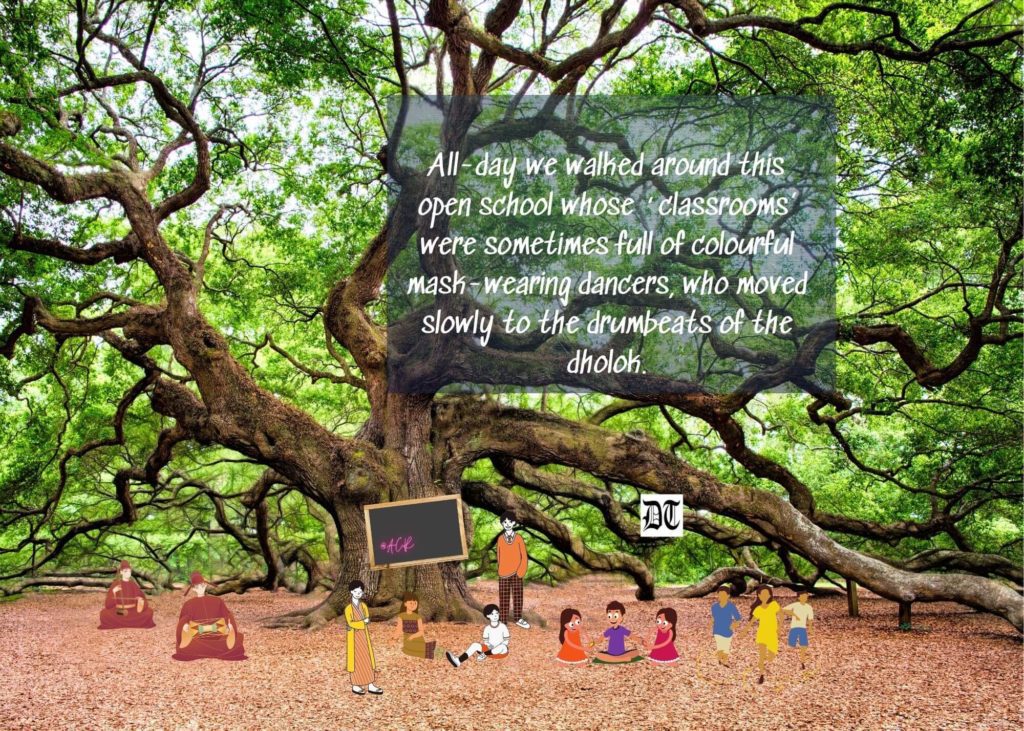
Under a banyan tree with its shady branches that sent roots deep into the earth, girls in sarees and boys in kurtas and dhutis stood with brushes and colours made from the stalks and flowers and leaves drawing beautiful pictures of trees and birds. Under every tree, we met happy learning happening. There were no unlucky windows from which one looked longingly, sadly at trees and birds outside. Potters at wheels, weavers weaving magic baskets, and at every corner somebody learning something. We kids scraped the banks of fishy-smelling ponds where the bulrushes and bamboo grew. We bent them into bow shapes and tied the two ends with string. Then we sharpened bulrush stalks to make arrows, which sped out like lightning from the tight bowstring. We roamed the meadows carrying our bows and arrows in search of the syrupy sweet Taal Shaash or Asian Palmyra, which lay quietly on the ground knocked out by the height from which it fell. The date-palm syrup man, Jhontoo, wore his white piece of dhuti between his dark muscle-moving legs. On a long bamboo, which crossed his naked shoulders, he hung two clay pots full of a dark brown Khejur Gur (date palm syrup). He walked quickly in a dancing sort of way, balancing the pots filled with the syrup which he tapped out of the tree. Seeing him coming out of the faraway setting sun, we thought he was Mahatma Gandhi. Mother told us Mahatma Gandhi went to England to meet the King, wearing a piece of cloth between his legs, and that’s all.
All the King’s horses, and all the King’s men, had looked rather foolish in so many clothes! Gandhiji was able to walk so fast because he didn’t have to balance a gold crown with diamonds and rubies on his head or wrap himself up in long velvet cloaks and fur, or force others to carry his long cloak when he walked. They had laughed at Gandhiji at first and called him the naked fakir. Then they wanted to know why he was not dressed up like them. So he had said, “the people of my country are hungry and poor and naked.”
Rabindranath Tagore also told the English Queen she could please have his knighthood back, which meant he no longer wanted to be called sir as a protest against the Jallianwala Bagh massacre, in 1919. We were told about Jallianwala Bagh in detail with some horrible descriptions by none other than Haru Mana, who hated the English because he could not speak a word of English himself.
On rainy afternoons, the rain screened the green maath (field), which stretched out in an endless way. The evening twilight time was time for all the cows to go home. “The vegetables and the fish taste so fresh and different,” Mother would sigh. One day from the steps that go into the house through the verandah, Postman Kaltu-da delivered a brown paper parcel. It was from Father. “Enemy guns have mounted heat,” he wrote to Mother. It would be another six months before we could come back and take us to somewhere we could all be together. Until then, though, we would have to live from parcel to parcel. Storybooks fell out of the brown paper packages as we hurriedly tore them open. Aesop’s Fables, Moby Dick, Robinson Crusoe, Peter Pan and Lamb’s Tales from Shakespeare. I liked the crocodile who swallowed a clock that ticked away in his stomach. The great Rabindranath Tagore – Robi Thakur also wrote stories for children. Kabuliwala and Other Short Stories, The Astronomer, Clouds and Waves, The Prince and Other Modern Fables, The Land of Cards. Meshomoshai got them for us from Calcutta. Mother read them out for us in Bangla.
In Bolpur, they sold Koi maachh in earthen pots filled with water. The jumping Koi maachh with its dead fisheyes was cooked in a black iron korai (wok) on a kerosene stove by Mother’s cousin, Moyna Mashi. Koi maachh is a mouthwatering fish dish fit for kings. It was as big as our palm and it hopped about in boiling hot oil and mustard curry. “It’s legendary death-defying acrobatics right in the heart of a sizzling machher jhol made it a much sought-after fish. This was because whoever eats this rare dish acquires some of the Koi’s fishy immortality! Moyna Mashi’s husband Shotyojeet Dhar explained to us. He taught English in the tree classrooms. The koi is a climber of trees. “Palm trees hugging river banks have Koi shinning up them. Fishermen shake the tree and there is the strange sight of a Koi shower. Just about everybody had such Koi stories to tell. It is traditionally carried in clay pots filled with water and covered with straw and tied with strings made of coconut palm leaves to faraway places for wealthy Koi eaters.
At Robi Thakur’s ancestral home Jorasanko Thakur Bari, his favourite fish Koi was cooked in mustard oil and ear-buzzing mustard paste. His poem Damodar Sheth is all about different types of fish dishes. Haru Mama loved reciting this during meals.
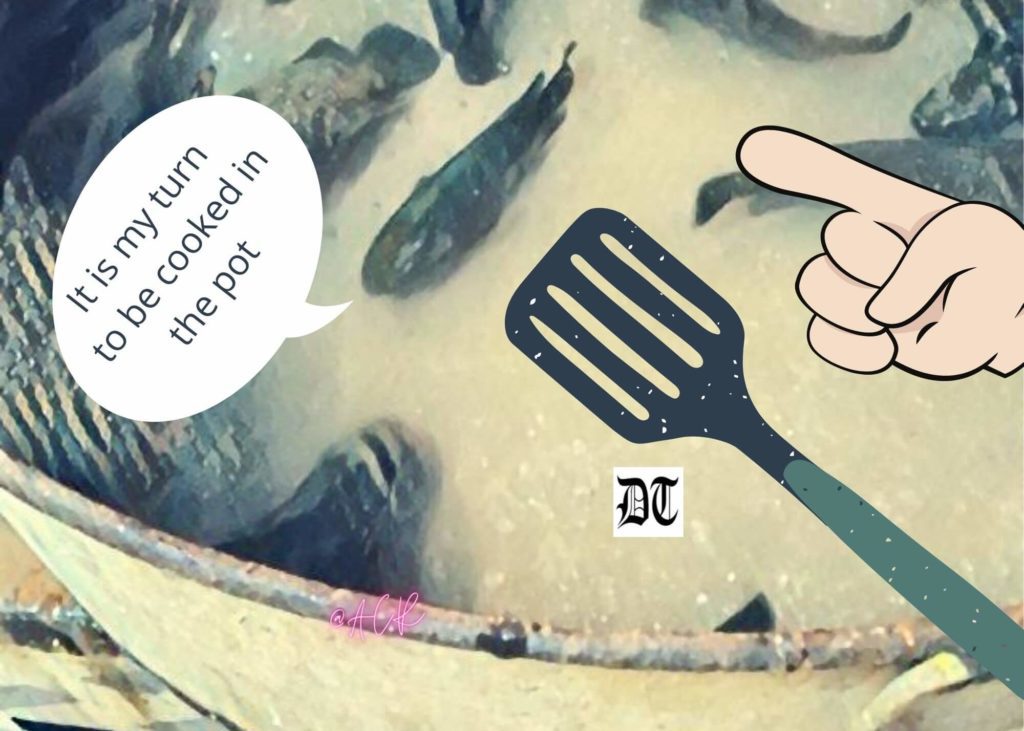
Bolpur, the village where Robi Thakur built his tree school, had a very damp wall peeling movie hall called Dreamland. The small screen put out more nightmares than the dreams it promised. The mostly broken or about to break seats with their Rexene and sponge, were ripped in excitement or perhaps anger. On cousin Mithoo’s birthday we went to a film show at the bug biting Dreamland. Haru Mama and Mishti Maima and Moyna Mashi and Mother took us.
We walked quickly across wide maidaans and across shallow drains through a ‘short cut’ to the shanty bazaar where Dreamland sat. “Cinema, is very popular in these parts yet it is considered a morally depraved activity which seduces people from work and study,” Mother had patiently explained to whoever was ready to listen. “But if it is a mythological or socio-religious film then it is important for women and children to see it for the purpose of learning Indian culture,” Moyna Mashi added, “Films about gods and goddesses let the filmmaker sell all sorts of foolish ideas about women’s role in society. Good women are good wives and good mothers, which means sacrificing all their pleasures for the pleasure of husband and children.”
The women actors cried a great deal and the women in the hall also cried and turned up again the next day to cry some more. We had never seen Mother crying. Nor did we ever see Moyna Mashi, Mishti Maima, Aunty Jehangir, Aunty Muthuswamy or Pati Amma weep all day long about their cruel destiny or wishing loudly that they were not born women. Later, when I grew up and read Tagore’s novels and short stories, I knew he had written about women like them. Strong and resilient, bold and capable, unafraid to express desire or take action. The film called Prahlad brought out sweaty smelly crowds from nearby villages. They jostled and pushed and passed remarks and cracked jokes at Mother’s permed hair and silk sari, my sister’s satin ribbons and ringlets, and my short boy hair. “Firangees”, they mumbled about us. Or could be “Isai” others explained. “Have you ever seen a black Inglisman?” they started and laughed at us. When they heard Mother speak to Moyna Mashi in Bangla, one of them said in pretended amazement, “Orey baba!” So we were, “Bilayut pherot,” – those who had been to England and returned. We were “the polluted ones.” We had ostensibly gone to England and eaten beef and now returned as outcasts. “These are illiterate louts and no one need pay attention to such people,” Father had consoled when we came to take us back.
October drums signalled the arrival of the Goddess with ten hands riding a lion. Her eyes, they say, are like lotus. Everything has turned the green of the monsoon rainy months into bright red and orange. Women pasted the parting of their hair with red vermillion shindoor and stained their feet in bleeding red, and wrapped their wrists in red bangles and dressed up like brides. Haru Mama had returned from the Big City, bringing a bottle of goat’s blood with which Mother and Mishti Maima and Moyna Mashi and Joya Didi, who had come over to watch the Jatra began to colour their feet. Aalta, a cousin explained to my sister and me was actually the blood from a freshly killed goat. Blood is squeezed out of a sacred goat after the priest acts like he is the black Goddess Kali and drinks the first gush of blood from the goat’s head. Some people feel this blood is not the right one because of the way the goat’s throat has been slit. Slowly, slowly. Only if it has been done in one stroke of the sword and “Joi Ma Joi Maa Durga Kaali etc. etc.” shouted is the blood pure. “Bismillah Bismillah” will not do. But God has many names. Mother was saying God has Sahastranaam. At night I dreamed of Mother looking like Mishti Maima riding on the back of a headless ghost goat with a whip in her hand. “Why are you staring at me like this?” Mother asked us the next morning. “Does Father know?” my sister asked, staring at Mother’s blood-stained feet. “Know what?” she asked without paying attention. “That you dip your feet in goat’s blood?” Mother looked up. She was frying pieces of Rui maachh for Haru Mama’s breakfast. “Where will I get goat’s blood even if I want to?” Mother had become very cunning. “Haru Mama brought for you. Boroon told me.” “Did he know? Goat’s blood is very good for my feet.” Mother replied not at all afraid. “But it’s not good for the goat,” my sister’s voice choked. “Is that so? Then I promise not to use it again,” Mother said in a soothing voice. Now, we know that Aalta is made of the crushed juice of the red Jabakusum flower.
Bikashda lived inside Shantiniketan and was a sculptor, who made statues only of Gods and Goddesses. For seven days we whispered and nudged each other and watched him silently tie bundles of straw into shapes of hands and legs and heads like scarecrows. Before our wonder-struck eyes the straw body grew flesh and became a goddess. Brown mud, white mud and colours made out of leaves and flowers and roots. Satin and gold had changed straw into a Goddess of great beauty and power. “The mud comes from the house of a prostitute.” Sheila spoke in a low voice followed by a fit of giggles. What drew excited whispers most is the buffalo head of the Asura demon on whose blood-covered chest the Goddess had placed her small red foot. Aalta the red hibiscus juice was meant to look like her blood-dipped foot. Keep evil down! The Asura was black as hell and the Goddess was pink and white just like English ladies. “She eats porridge for breakfast. Look at her rosy red cheeks.” We giggled and Boroon hit me on the back of my neck with his knuckles and asked me to shut up and not show off my stupid English. There was nothing worse than a kaala Indian trying to be like a white Englishman. The Didi and Dada crowd was busy singing songs and acting and reciting.
“Oh you shut up. Only Junglee Indians can’t speak English!” Boroon pushed me hard and I fell on a pile of half-painted hands and legs looking like a broken Goddess. Bikashda who had not looked at us even once as he worked all these seven days now turned around and looked at us in a what are you children up to look at?” And said “What are so many asuras quarrelling here for? The Goddess will get very angry.” As the goddess looked over us we sat mouth open till the curtains moved to show us how a man called Mir Qasim cheated Nawab Siraj ud-Daulah (known to us as Shirajudulla). The Englishman Lord Clive was actually not English. A man called Company Bahadur was mentioned a number of times but he never appeared on the rickety wooden stage. We listened amazed as Lord Clive, an Englishman, spoke in Bangla with an English accent. It was Shirajudulla’s wig with its loose curls that flew from left to right as he spoke in a loud excited and sometimes king voice which sent all five of us into belly-aching laughter and we fell on each other as our breath caught in our lungs.
On the tenth day, which is Bijoya doshomi, a truck that carried stones from the quarry eleven miles away carried the Goddess away. Mr. Batoball and Haru Mama and many nosy people and the Shantiniketan tree classroom boys scrambled onto the already full of people truck yelling shouts of victory because the Goddess is so strong. “Joi Maa Durga, Joi Maa Durga!” they shouted. “Why do they throw her into the water?” “We humans cannot live with so much goodness. It is difficult”. Haru Mama started to lecture. If only Haru Mama wouldn’t say these things we could like him. Tilting forward fear writ large on her face, the Goddess went in the truck. She is taken away quite against her wishes by crowds of people very happy to drown her in the river, which makes its way across many miles. “Ki dekhchish, bilaayot pherot?” two grinning louts on bicycles whizzed past. My sister picked up a stone as big as her small fist and flung it in their direction. “Yes, you stupid man. We are from England!” They turned back and laughed rudely, “Arrey baba, homko bhi English aata hai blaady phool you!”
Father’s return put an end to fried fish for breakfast. No more Rui maachh fried in mustard oil. It was back to cornflakes and milk and oats. Students who come from other parts of the world to study at the University Under the Trees, sold off their cornflakes to the village grocer once they smelled the taste of fried fish in mustard oil. Haru Mama knew the only way for him to survive was to change Father. “The way to a man’s heart is through his stomach.” Father forever said this to Mother. It is not the small black Koi maachh but the silvery-white hundreds of bones Eeleesh maachh, which changed the colours that coloured Father’s mind. The sweet-smelling Eeleesh needs to be touched. God made fingers before he made forks and spoons. Father had broken years of “discipline” to begin using his god-made fingers to blend hot white long grained rice with the famous Eeleesh fish steamed in-ear buzzing mustard. Nobody knew when he had started to suck and chew the head of the Rui fish like Haru Mama did. Haru Mama did not get the head of the Rui fish anymore. It is always reserved only for the husband or any other important male of the household because of its brain improving qualities. Father was back, as were the ghosts with the lanterns across the moon-touched maidaan. “That’s a willow-of-the- wisp,” Father reminded us. “These are light flares in marshy land where deposits of oil may come to the surface.” Science couldn’t chase away our fears. Mother sang from Tagore “my rain-washed full moon tonight you hide yourself from me…” The moonlight created eerie shapes and increased our sense of being followed, watched, touched, and cornered. The darkness never totally goes away. The flickering lights of lanterns made haunting shadows that stayed with us always and forever.
Coolies in red shirts and red scarves or cloth turbans tied on their tired heads sat on their haunches, smoking beedis patiently waiting for the train to arrive and unload its baggage. Mother never haggled with a coolie. “They carry our burden and make light their own,” she would say. Mother could never understand why certain people thought the washermen (dhobis) people and the sweeper people were “dirty people.” “How foolish to shun people who we need most. If they refuse to sweep the streets or your house or wash your clothes you will have to do it yourself. Will you not become an outcast then? That way the English people are great,” she’d say as if she were proud of them. “They all do their own work and don’t expect others to do it. We first make certain people wash our clothes and clean our toilets and then we tell them they are dirty people because they are toilet cleaners and that they must not dream of anything else except toilets and dirty linen.” Gandhiji and Robi Thakur wanted to change it all. They cleaned the toilets in the sweepers colony to atone for all that we have done for centuries to our fellow men. And women.”
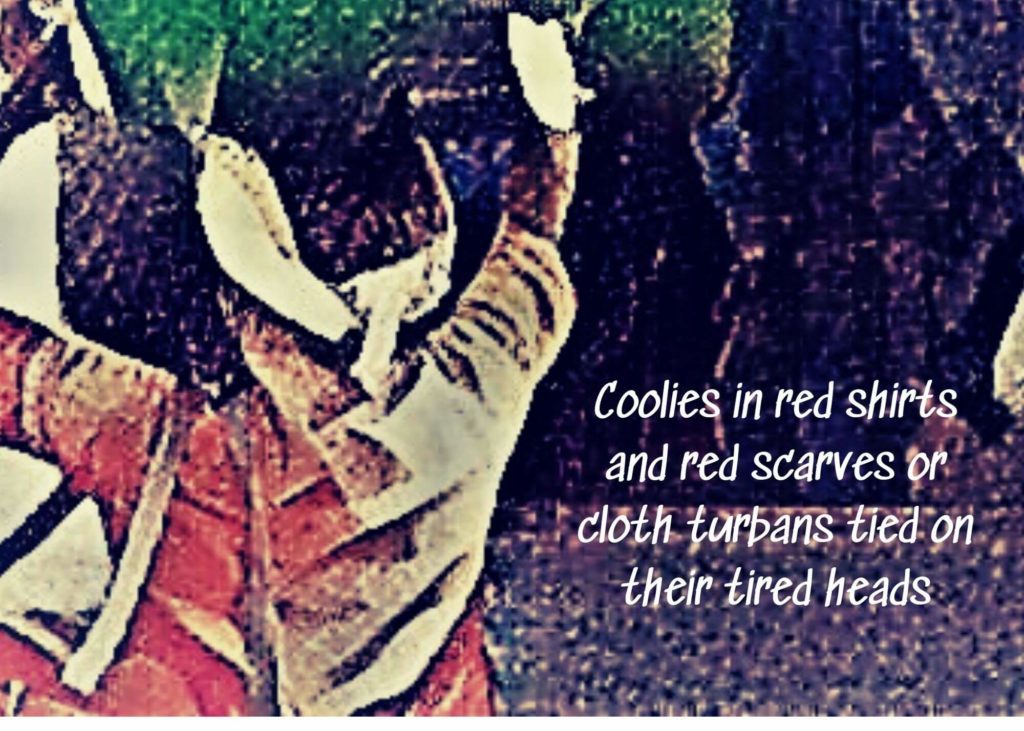
A sweet seller was pushing his cart full of fly-sitting jilaapi and shingaara from one end of the platform to the other. He too was waiting for the train that would bring people-flies to his cart. Father was standing next to the pile of black boxes, which has remained locked all these many months in Mr. Batoball’s godown. Three thin men wearing only vest and dhoti and two raggedy children were looking at the black boxes and at us without blinking their eyes. “Areeey”, they struck their heads with their hands, “these fellows are from the Jaatra party!” My sister was rather proud of being a part of the Jaatra party. She thought it was a movie. Father knew they meant it as a bad thing. “Ill-mannered fellows. Bloody louts.” The Jaatra is a village theatre. The actors and actresses and others travel from one village to another village enacting stories from the epics of Ramayana and Mahabharata and other such stories. Their way of life is bohemian and therefore suspect. “How easily they have understood our life,” Mother always spoke in a sad sort of voice. “The black wooden boxes and the big steel trunks truly contain our ever-shifting home. Like the Jaatra party we too have been moving from place to place setting up our temporary lives the proportions of which are epic and quite often melodramatic.”
“Are we gypsies, Father?” Suddenly the shrill long whistle of the Express startled awake this sleepwalking Bolpur railway station, the way Prince Charming’s magic kiss woke up the Sleeping Beauty and her whole sleep-ridden kingdom. It was like what happened to Gautam Buddha. Everybody just woke up. The coolies ran first. And then everybody else. Noise filled up all empty spaces. People shouted, ran, yelled and threw luggages of all kinds and shapes through windows into the unreserved compartments. My sister and I stood on the side so as not to get knocked over, while coolies loaded the black boxes into a reserved compartment, which was already full of people who shouted for our benefit that they didn’t believe in reservation, etc. We managed to squeeze ourselves in, the black boxes all piled up at the door. Five hours later we were in the big city Calcutta, where we were to board a bigger train on our two-day long journey.
“What’s all this about reservation?” One unreserved character spoke to the other with a mean look on his face. “I am a Bhi. Bhi. I. P,” the other replied, cocking his oil-streaked head to one side like a peacock. Even my sister and I knew he was talking about us. “Are you in Poleesh Department?” the unreserved character asked his unreserved companion. “No. I am in the Bhi. I. P. Dept.” “Oh really. Is that sho? Bhot position you are habhing?” “Nothing,” The pencil-thin moustache moved over the thin lips which barely covered the paan-stained big teeth. He looked at us in a manner of including us in the conversation. “You see, thees department is bheri bheri speshaal! It is full of bheri important people. Ebhribody going around wearing a crown, thinking he is Rani Bhictoria.” “Aacha! Aacha! But Rani Bhictoria Raj is obhaar?” There was a pause during which they both first looked at my sister and me and then at Mother. “Obh course. But some people still don’t know. You see, they are too biji polishing English boots they don’t know British flag is gone, gone, gone in the Hooghly ribhaar. Now, a new flag is flying. Our tiranga. Three colours. Green, white and orange.” One of them drawled. “That is why they talking rezaarbhation.” The mustard oil-smelling man added, “Maybe there ees tyoomaar in the brain bhich is caujing malaria.” They both patted each other’s thighs and laughed uproariously. Mother kept knitting with her four knitting needles grey woollen socks with squares copied from an English pattern book. Whenever she knit, Father called her Madame D’Farge.
Suddenly, the rude talking ended with an “Oi, Shaala!” They saw Father returning from the next coach with a constable from the Railway Police. The two Bhi. I. Ps picked up their luggage and their voices now had a whining note, “Of course, of course mai baap. We are just leabheeng.” The constable pushed them with his rifle. “You are our Father and our Mother.” Mai baap, mai baap they groaned. As the thin moustache man bent to pick up his string tied bedding, I reached out and pulled the tucked in tail of his dhuti. It trailed along on the filth and peanut shell-covered floor. The train began its chug-chug as it moved out of Bolpur station.
“This country is going to the dogs. Sometimes I really wish these English fellows had not left. Without the danda we Indians just can’t survive!” Mother was watching and listening to Father. She now spoke up, “The stick won’t work. Gurudev taught us not to fear the danda. Remember the Salt March to Dandi? Where the mind is without fear and the head is held high!
Visuals by Different Truths

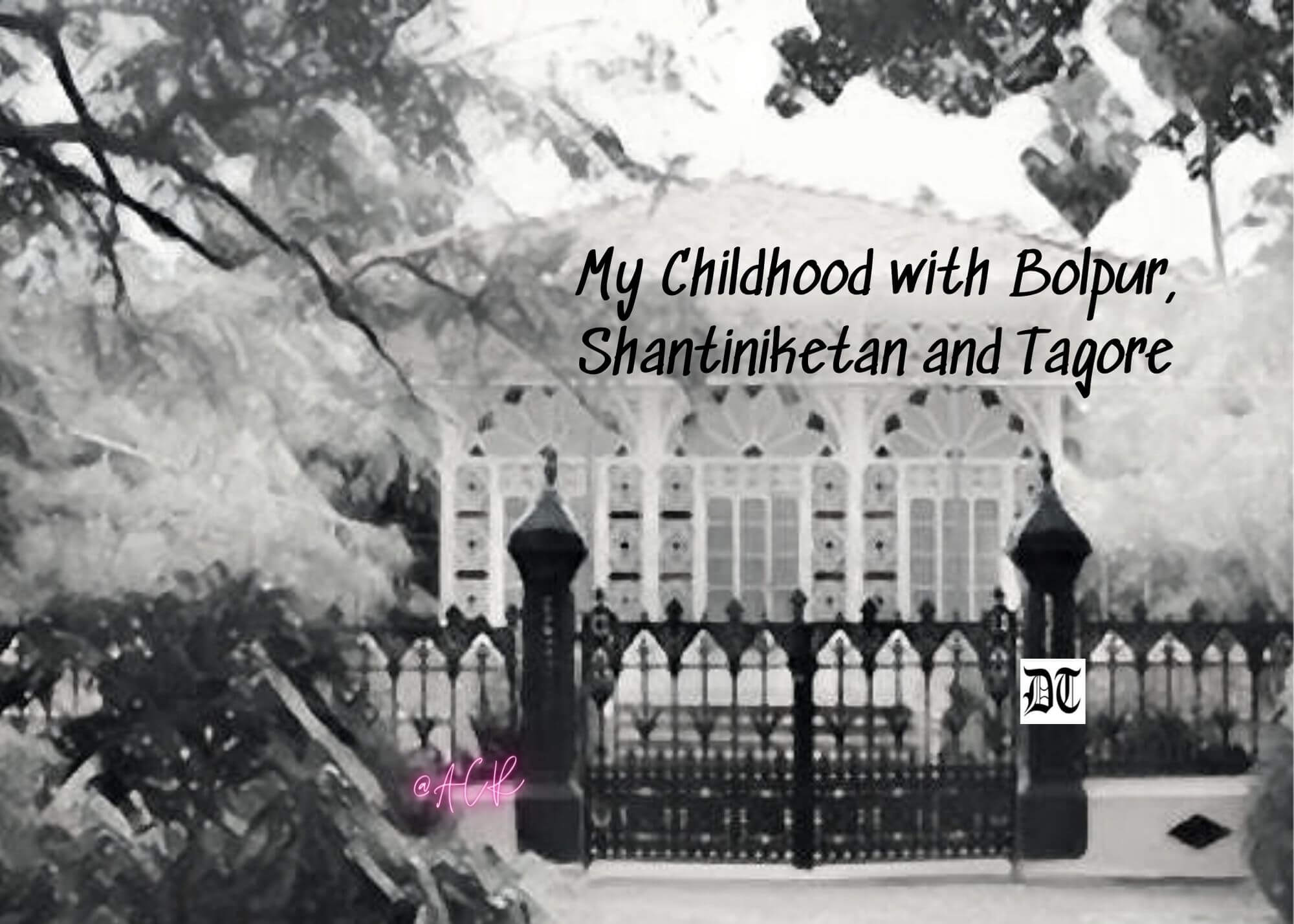
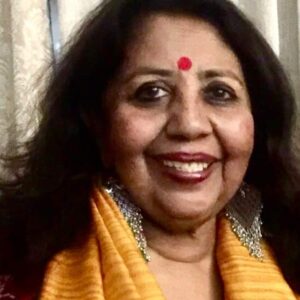
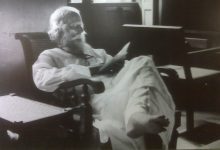
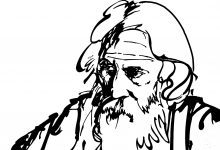

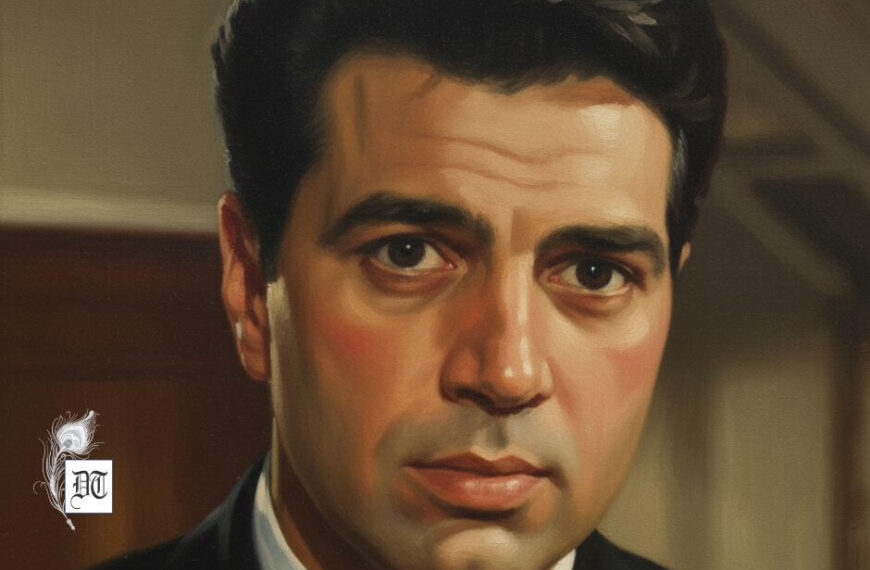

 By
By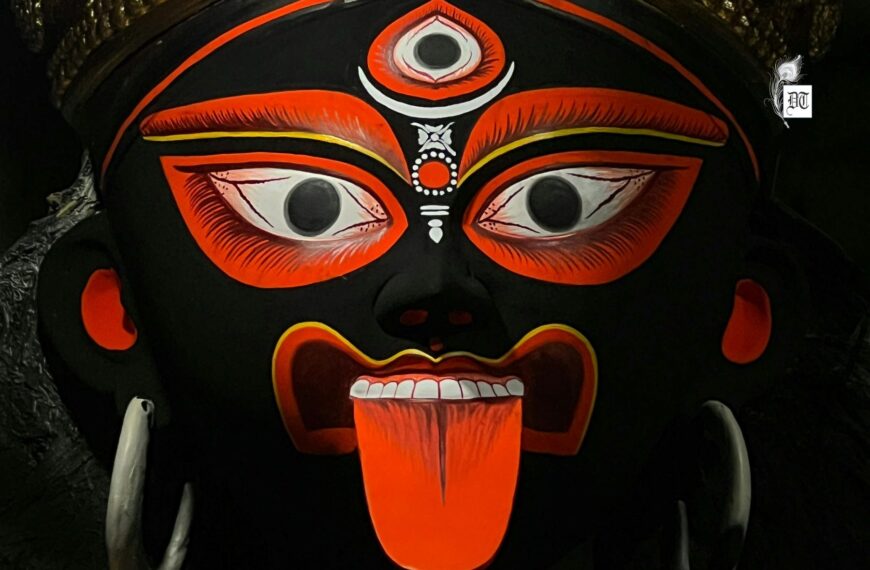
 By
By
Roopali, I loved it. So many vignettes woven into a large narrative. Precious memories written from the heart. Beautiful piece of writing.